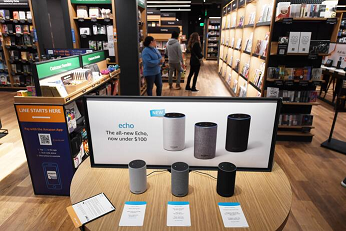Introduction
There are many creative and potentially helpful ways that voice assistants could be integrated into the library settings. This could enhance studies with music and effects, provide accessible services for elderly patrons or individuals with disabilities as well as an alternative access point for common library queries and institutional information (e.g. searching titles, placing holds, requesting library event information (Hoy 2018).
Amazon Echo is a voice-enabled wireless speaker developed by Amazon’s digital assistant. It was first launched in 2014. The device connects to a voice-controlled intelligent personal assistant service, known as which responds to the name “Alexa”. The device is capable of voice interaction, music playback, making to-do lists, setting alarms, streaming podcasts, playing audiobooks, and providing weather, traffic, and other real-time information.
Skyline University Nigeria has launched its voice assistant services so that users could find out information about library history and library collections. Using voice assistants will strategically engage the communities in the availability of Library resources. As voice assistants are more widely used, librarians will become familiar with the use of smart voice assistant that has continued to expand from personal uses in the home to new applications in customer services, healthcare, e-government, and educational spaces, as well as raising questions from groups and academic environment.
Exploring voice assistant use and potential data privacy implications requires a dearth of empirical studies that
- Answer to questions asked by users.
- Play music from streaming music services.
- Set timers or alarms.
- Play games.
- Make calls or send messages.
- Make purchases.
- Provide information about the weather.
- Control other smart devices (lights, locks, thermostats, vacuum cleaners, switches).

https://www.washingtonpost.com/technology/2019/05/29/amazon-adds-alexa-delete-commands/
According to Sheppard (2017), some key elements that distinguish voice assistants (Alexa) from ordinary Programmes are:
- NLP: the ability to understand and process human languages. It is important to fill the gap in communication between humans and machines
- the ability to use stored information and data and use it to draw new conclusions
- Machine learning: the ability to adapt to new things by identifying patterns
The complexity and accuracy of voice recognition technology and voice assistant software have grown exponentially in the last few years. Currently, available voice assistant products from Apple, Amazon, Google, and Voice assistants have several interesting capabilities in the library such as the capabilities of voice assistants are continuously extending. Amazon and Google have provided platforms for librarians to extend their assistants’ capabilities. Similar to mobile apps, Amazon Skills and Google Actions, radically expand assistants’ repertoire, allowing users to perform more actions with voice-activated control in their environment.
Conclusion
Intelligent personal assistant technology (IPA) is becoming the other of the day in libraries. The use of voice assistants Alexa in libraries has made a big way in Library and raises questions about the responsibility of libraries and librarians to actively engage patron data privacy concerns when considering integrating these technologies into services, it is also paramount that patron privacy (as a function of safety) stays at the forefront of library services. Alexa in the library is making the service of a librarian much more user-friendly in the 21st Century.
References
Amazon.com (2018). Blind Foundation. [online] Available at: https://www.amazon.com/BlindFoundation-New-Zealand/dp/B07J6HVVTV [Accessed 5 JUN. 2021]
Shead S (2017, April 6) REPORT: 1 in 4 people have fantasised about Alexa, Siri, and other AI assistants. Available at: http://www.businessinsider.com/jwt-speak-easy-study-peoplefantasised-about-alexa-2017–4 (accessed 12 June
2017)
Griffin, P. (2018). The best smart speakers on the NZ market. [online] Noted. Available at: https://www.noted.co.nz/tech/google-home-amazon-echo-smart-speaker-best-options-nz / [Accessed 04 JUN. 2021]
Hoy, M. B. (2018). Alexa, Siri, Cortana, and More: An Introduction to Voice Assistants. Medical reference services quarterly, 37(1), 81-88.
Sheppard, B. (2017). Theological Librarian vs. Machine: Taking on the Amazon Alexa Show (with Some Reflections on the Future of the Profession). Theological Librarianship, 10(1), 8–23.
Mr. Musa Muhammed, is the Assistant University Librarian in Skyline University Nigeria. He has MSc in Information Management from Leeds Beckett University, UK.
You can join the conversation on Facebook @SkylineUniversityNG and on Twitter @SkylineUNigeria
